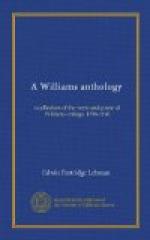In his devotion to the ideals of Williams as he saw them, Dr. Nelson was, many have said, more distinguished by manly but quiet zeal than any other graduate of his prominence in public life. He stood for scholarship, fine scholarship of course, but even above that he put honor, a gentleman’s code of honor. He was unconditional in his contempt for hedging, for trickery, for meanness. Constantly he showed himself an idealist, as in his advocacy of an absolute honor system. But in all there was the play of a shrewd wit, the touch of sureness, lacking snobbery, of the man who knows where he stands, and a love of entertaining others. For only six years we knew him as a teacher, but the time was long enough for many of his ideals and ideas to take root, and the fruit of them will long be apparent.
VII. HARRY PRATT JUDSON
GEORGE EDWIN MACLEAN ’71
Harry Judson entered Williams from Stillwater, New York, and it was said that he made the best entrance examinations ever passed up to that time. Immediately upon his graduation, the third in his class, in 1870, he taught public school in Troy, and was initiated as a reformer in municipal politics when Troy was infamous for corruption.
The second public era of his life, 1885 to 1892, witnessed his introduction to the West as professor of history in the University of Minnesota. This was the time of the refounding of that institution under the beginning of President Northrop’s administration, to whom Professor Judson became a right hand. His career is an illustrious example of one rising slowly and patiently through every grade of the public school system, to its crown in the highest grades in the state university. It must have been of inestimable worth to him to become familiar with the genius of a state university, so peculiarly a people’s institution and so characteristic of the middle West.
Unconsciously he was preparing for crowning his career in the new University of Chicago. It is not strange that, in 1889, three years before he became a member of the university’s first faculty, President Harper’s attention was attracted to him, and he brought the early drafts of his plan for a herculean university to Professor Judson for criticism. When the inner history of that university is written, in my opinion, the world will be surprised to learn of the contribution of Professor Judson, who was Dr. Harper’s Secretary of the Interior from the beginning. What Mr. Rockefeller was as a silent partner in money matters, Dr. Judson was in matters of the mind.




